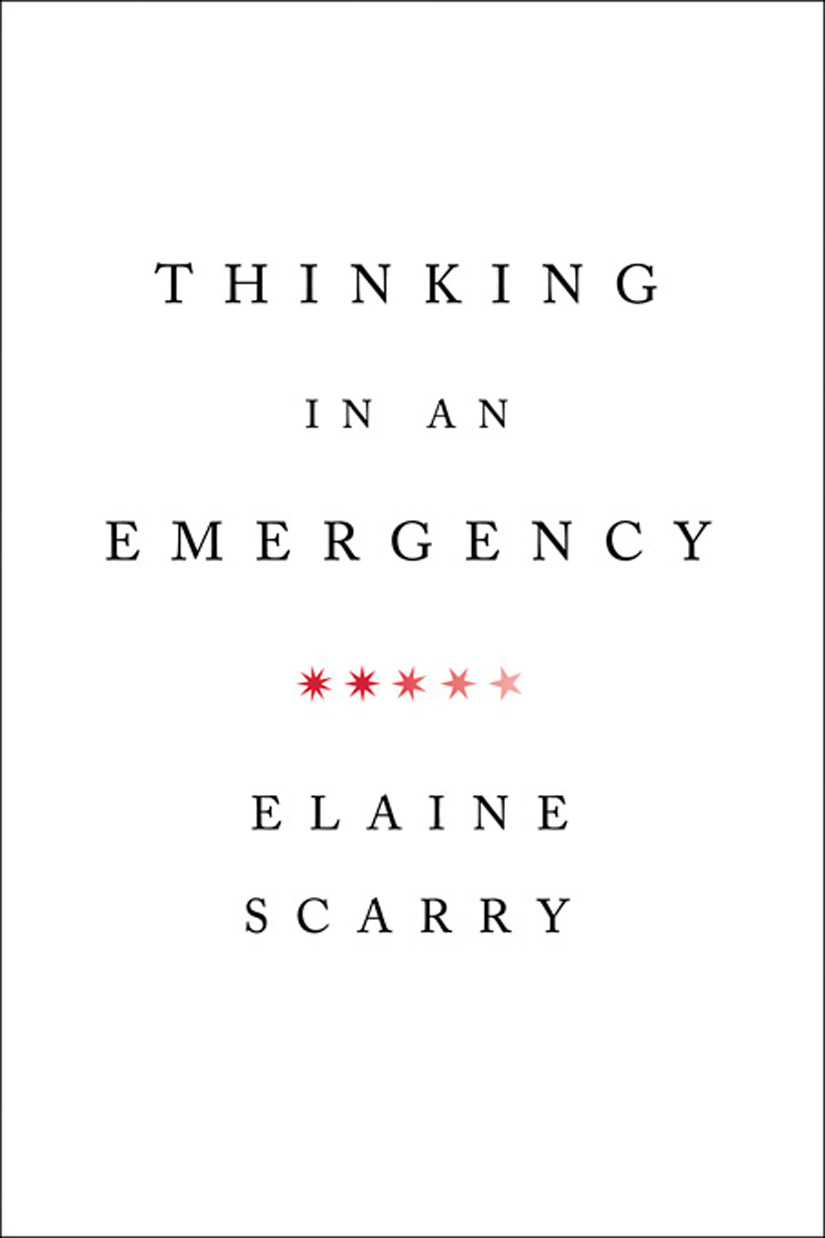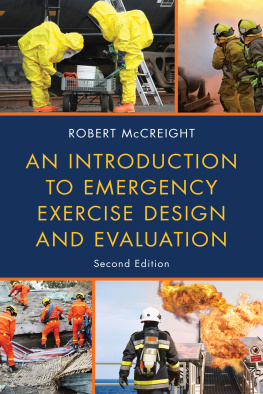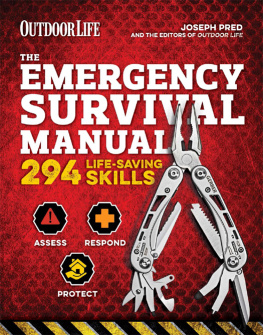Scarry - Thinking in an Emergency
Here you can read online Scarry - Thinking in an Emergency full text of the book (entire story) in english for free. Download pdf and epub, get meaning, cover and reviews about this ebook. year: 2011, publisher: Norton, genre: Politics. Description of the work, (preface) as well as reviews are available. Best literature library LitArk.com created for fans of good reading and offers a wide selection of genres:
Romance novel
Science fiction
Adventure
Detective
Science
History
Home and family
Prose
Art
Politics
Computer
Non-fiction
Religion
Business
Children
Humor
Choose a favorite category and find really read worthwhile books. Enjoy immersion in the world of imagination, feel the emotions of the characters or learn something new for yourself, make an fascinating discovery.

Thinking in an Emergency: summary, description and annotation
We offer to read an annotation, description, summary or preface (depends on what the author of the book "Thinking in an Emergency" wrote himself). If you haven't found the necessary information about the book — write in the comments, we will try to find it.
Thinking in an Emergency — read online for free the complete book (whole text) full work
Below is the text of the book, divided by pages. System saving the place of the last page read, allows you to conveniently read the book "Thinking in an Emergency" online for free, without having to search again every time where you left off. Put a bookmark, and you can go to the page where you finished reading at any time.
Font size:
Interval:
Bookmark:

AMNESTY INTERNATIONAL
GLOBAL EITHICS SERIS
General Editor: Kwame Anthony Appiah
In December 1948, the UN General Assembly adopted the United Nations Declaration of Human Rights and thereby created the fundamental framework within which the human rights movement operates. That declarationand the various human rights treaties, declarations, and conventions that have followedare given life by those citizens of all nations who struggle to make reality match those noble ideals.
The work of defending our human rights is carried on not only by formal national and international courts and commissions but also by the vibrant transnational community of human rights organizations, among which Amnesty International has a leading place. Fifty years on, Amnesty has more than two million members, supporters, and subscribers in 150 countries, committed to campaigning for the betterment of peoples across the globe.
Effective advocacy requires us to use our minds as well as our hearts; and both our minds and our hearts require a global discussion. We need thoughtful, cosmopolitan conversation about the many challenges facing our species, from climate control to corporate social responsibility. It is that conversation that the Amnesty International Global Ethics Series aims to advance. Written by distinguished scholars and writers, these short books distill some of the most vexing issues of our time down to their clearest and most compelling essences.
Our hope is that this series will broaden the set of issues taken up by the human rights community while offering readers fresh new ways of thinking and problem-solving, leading ultimately to creative new forms of advocacy.
FORTHCOMING AUTHORS:
Rory Stewart and Gerald Knaus
Richard Thompson Ford
Jonathan Wolff
John Broome
Sheila Jasanoff
Martha Minow
Philip Pettit
John Ruggie
ALSO BY ELAINE SCARRY
The Body in Pain: The Making and Unmaking of the World
Resisting Representation
On Beauty and Being Just
Dreaming by the Book
Who Defended the Country?
Rule of Law, Misrule of Men
THINKING
IN AN
EMERGENCY
Elaine Scarry

W. W. NORTON & COMPANY
NEW YORK LONDON
for Eva Scarry
19212010
librarian, grammarian, best teacher, sweet friend
CONTENTS
PREFACE
A s a child growing up in the high hills of South India, Rae Langton used to walk to school side by side with a friend. So did all the other children. They could be seen each day moving two by two along the pathways in a long undulating line, chattering, laughing, holding hands. The children called it walking in croq because collectively they moved like a crocodile toward their shared destination.
Overnight this practice changed. Walking in croq was suddenly prohibited. The flow of schoolchildren could still be seen each day as they made their way across the terraced hillside, but now they moved in single file or in atomized clusters of two or three.
Walking two by two in a line was construed to be a form of assembly, and the right of assemblyas well as Indias other fundamental rightshad been suspended as of midnight, June 25, 1975. The mountain town of Ooty is 2,000 kilometers from the seat of government in Delhi, but Prime Minister Indira Gandhis act had entered directly into the texture of the schoolchildrens lives. The children of this town were not privy to the severe abuses and injuries that would now take place: the cutting of electricity to opposition newspapers, the imposition of severe censorship once the electricity was restored, the detaining of thousands of persons without charge and without release of their names, the involuntary sterilization of many who were detained. But despite their separation from the site of grave injury, the children had a physical sign in their environment that some profound change had just come about.
The abridging of rights and laws more often lacks any sensory manifestation. Persons who are not themselves directly injured often do not even know that any substantive change in the laws has taken place. If at the moment that President George W. Bush secretly authorized torture the residents of the United States had been required to begin walking in single file, the enormity of the legal change might have been easier to grasp. They would be concretely aware that their shared legal universe had changed, and perhaps they would suspect that somewhere somebody else might be paying a heavy price for the change.
What about the profound legal change that comes about once a country acquires nuclear weapons that allow the executive of that country to kill many millions of people in a foreign land? If at the moment the change was initiated the residents of that country had been henceforth required to walk backward wherever they went, they would be steadily aware that a major alteration had occurred. The sustained discomfort of walking backward would surely trouble them on their own behalf. It would almost as surely prompt them to worry about the enormity of the far-heavier price that some unseen population might eventually pay for the mysterious change.
It is not the case that any of the eight nuclear nations have required their populations to walk backward physically, even though that is precisely what those populations have been asked to do legally, morally, and spiritually. Nuclear weaponstheir possession, threatened use, or usereenact on a vast scale the structural features of torture. Both torture and nuclear weapons inflict their injuries without permitting any form of self-defense; both inflict their injuries without obtaining any authorization from their own legislatures or populations; both starkly nullify even the most minimal requirements of a contractual society; both destroy the foundational concept of law.
Thinking in an Emergency is a reminder of what in the nuclear age we sometimes seem to have forgotten: that we have both the responsibility and the ability to protect one another, both within the boundaries of our own nations and across national boundaries. Once we hold in front of our eyes the landscape of actual emergenciesas the central chapter of this book asks us to dowe can recognize the deep principles of mutual protection that consistently appear, whether in the act of a midwife in Zambia trying to save a newborn with CPR, a commune in Saskatchewan building a raft to rescue stranded villagers, or an entire national population in Switzerland working in concert to uphold their commitment to equality of survival. We can and ordinarily do retain our ability both to think and to act in emergencies, and should not be misled by governments into believing that the speed of modern life requires that populations step aside and stop thinking while larger and larger arsenals are accumulated whose only purpose is to injure.
We need to turn to this work of mutual protection. If we are late in beginning, we are not yet too late.
Chapter One
THE SEDUCTION TO STOP THINKING
I n his mid-twentieth-century book on Constitutional Dictatorship , Clinton Rossiter predicted that the atomic age would soon be governed by emergency rule and a solitary executive figure.
There are, of course, distinctions among the eight nuclear weapons states. Of 22,600 weapons held worldwide, the United States and Russia hold 21,600 of them.
While these and other differences are important, what unites the eight countries should be kept steadily in view. Each has the capacity to kill millions of people; each has placed that capacity in a small number of hands; each has bypassed the distributional structures that characterize democratic governance; and each has a population that could bring its own national laws (as well as international laws) to bear on ridding itself of both the nuclear weapons and the legal deformations those weapons cause.
Next pageFont size:
Interval:
Bookmark:
Similar books «Thinking in an Emergency»
Look at similar books to Thinking in an Emergency. We have selected literature similar in name and meaning in the hope of providing readers with more options to find new, interesting, not yet read works.
Discussion, reviews of the book Thinking in an Emergency and just readers' own opinions. Leave your comments, write what you think about the work, its meaning or the main characters. Specify what exactly you liked and what you didn't like, and why you think so.





